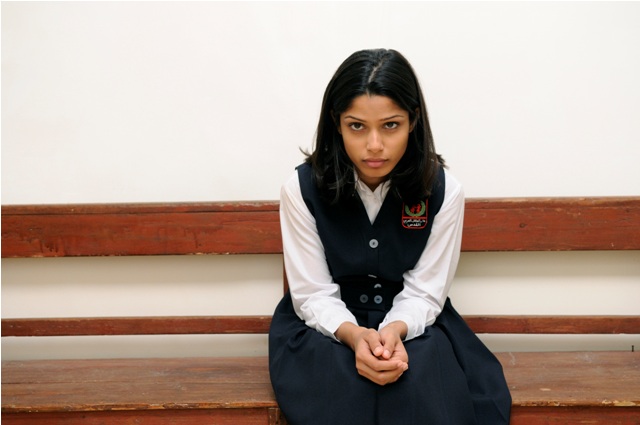CHICAGO – In anticipation of the scariest week of the year, HollywoodChicago.com launches its 2024 Movie Gifts series, which will suggest DVDs and collections for holiday giving.
‘Miral’ Succeeds as Historical Drama, Falters as Character Study
 Rating: 3.5/5.0 |
CHICAGO – No matter how many films he makes, Julian Schnabel may always consider himself a painter first. Watching one of his cinematic efforts is akin to being pulled headfirst into the vivid and visceral canvas of a true neo-expressionist. His work aims to engulf the viewer. It shatters the barriers between a contrived character’s existence and that of the flesh-and-blood audience.
A clue to his approach can be found in the subtitle of his upcoming Venice exhibition, the “Architecture of Seeing.” One of the greatest achievements in cinematography over the past decade was Janusz Kaminski’s brilliant imitation of paralyzed journalist Jean-Dominique Bauby’s perception in Schnabel’s 2007 masterpiece, “The Diving Bell and the Butterfly.” For lengthy stretches in the film, the camera peered through Bauby’s eyes, allowing the viewer to experience the disorientation, isolation and frustration of his locked-in syndrome first-hand. It may sound depressing, but the film is utterly exhilarating.
Sadly, the same cannot be said of Schnabel’s latest picture, the equally audacious yet naggingly bland “Miral.” It’s the first film made by the director that feels as if it were made for someone other than himself. The characters emerge as two-dimensional symbols rather than three-dimensional beings, and every time they open their mouths, their words sound like scripted dialogue rather than spontaneous expulsions from their soul. The subject matter could not be more vital or inherently dramatic, and the film succeeds in its goal to make the material accessible to a mainstream audience. It’s touching, provocative and assuredly enraging, but Schnabel obviously intends for it to be so much more. His close collaborator and current girlfriend, Rula Jebreal, based the script off her own semi-autobiographical novel, and it’s clear that her story was intended as both a call to peace and a love letter to her country. “Miral” is nothing if not a sincere project, but it’s difficult to determine whether Schnabel is either too close to the material or not close enough. While it is certainly the least of Schnabel’s directorial efforts, the film is not without its moments of visionary brilliance and emotional power. Yet it’s ultimately as diverting a picture as Tim Burton’s “Alice in Wonderland”—you like what you see enough to make you wish that you felt more deeply about it.

Freida Pinto stars in Julian Schnabel’s Miral.
Photo credit: The Weinstein Company
In purely political terms, the film is straightforward in its message. Since the Israeli-Palestinian conflict threatens to rage on until the end of time, it’s only natural for a sensitive and perceptive artist to try building bridges of communication through their art. All of Schnabel’s “protagonists” have been ostracized by their communities, and are often regarded as a member of the “other.” It’s to the director’s credit that he consistently strives to highlight the universality of the human experience, allowing his characters’ struggles to resonate on an effortlessly relatable level. The titular character in “Miral” is an orphaned Palestinian woman, based on Jebreal and played by Freida Pinto, who was dropped off at the Dar Al-Tifel Institute, an orphanage and school in East Jerusalem, by her father, Jamal (Alexander Siddig), in 1978. Miral was only five at the time, though she was quickly taken under the stern yet motherly wing of the institute’s founder, Hind Husseini (Hiam Abbass). Within the safely enclosed environment of the school, Miral was able to gain an education while maintaining her Palestinian identity. Yet Pinto doesn’t enter the picture until the halfway mark, when Miral turns sixteen, and the First Intifada begins to rear its head. As Palestinian protestors take to the streets in their attempts to resist the Israeli occupation, Husseini shuttles her girls to volunteer at a refugee camp. It’s there that Miral witnesses firsthand the atrocities committed against her people, thus leading her to fall for an impassioned activist, Hani (Omar Metwally).
This section of the film unfolds more or less in the way one would expect. Pinto’s stunning beauty doesn’t overshadow her attempts to create a grounded character, though there’s a certain urgency lacking from her performance, and the same criticism could apply to the film as a whole. Jebreal’s dialogue often spells out the film’s themes in too didactic a manner, causing some of the actors to appear stilted, despite their best efforts. The biggest casualty may be Abbass, whose magnificent work is marred by the moralizing monologues she’s forced to deliver. Yet what truly causes the film’s second act to suffer is its lack of a compelling lead. Miral functions less like a fully realized young woman, and more like the symbol for a generation of restless Palestinian and Israeli youth fed up with their leaders and fed up with the never-ending conflict. She’s a powerful symbol, but she would’ve been far more resonant if Schnabel hired a different screenwriter to make her more tangibly human. The true heart of the film lies in the character of Husseini, who dedicated her entire life to maintaining the orphanage, while truly believing in the transformative power of education. Any time Schnabel’s lens hones in on her, the film hints at the greatness it could’ve achieved by making her the primary subject instead (appropriately enough, she’s the only character afforded an epilogue).
 Alexander Siddig and Freida Pinto star in Julian Schnabel’s Miral. Photo credit: The Weinstein Company |
Yet the picture is worth seeing primarily for its first hour, where Schnabel jumps between the lives of various women whose acts of independence paved the way for Miral. It’s here that the filmmaker’s artistic eye is really allowed to shine. He finds subtle and rather ingenious ways to make Miral’s presence felt long before her entrance. Each of the women are viewed through the perspective of Miral, allowing the fluid gaze of cinematographer Eric Gautier (“The Motorcycle Diaries”) to become somewhat of a character unto itself. This is especially true of the scenes involving Miral’s abused and alcoholic mother, Nadia (played by a heartbreaking Yasmine Al Massri), whose brief life is reduced to a half-remembered image in Miral’s mind. Two particularly disturbing moments in the picture are viewed from Nadia’s perspective, a la “Diving Bell,” suggesting that Miral may have played these moments repeatedly in her head, placing herself in her mother’s shoes. The murkiness of these sequences contrast greatly with the nearly surrealistic brightness in scenes involving the birth of Hussieni’s school, which coincided with the birth of Israel in 1948. Throughout the picture, Schnabel switches film stocks, bringing a heightened clarity to some sequences and a raw graininess to others. Each of these stylistic choices develop Miral’s psyche in a way that no expositional dialogue ever could. Yet once Miral finally appears onscreen, Schnabel’s careful set-up never quite pays off. When it came to the film’s second act, Schnabel may have wanted to go back to the drawing board.
As educational entertainment for young viewers unschooled in the conflict, “Miral” will have served its purpose admirably. The American Jewish Committee has not helped its cause by protesting this film’s recent screening at the United Nations. This film does not demonize the Israeli side of the conflict, nor does it sugar-coat the Palestinian side. Perhaps Schnabel’s desire to swiftly tear down the security barriers may seem somewhat idealistic, particularly as the violence continues to escalate. Yet his film is a gift for all those who still dare to dream the seemingly impossible dream of achieving peace. One of the film’s cast members may also be classified as a triumphant dreamer: Israeli actor, filmmaker and activist Juliano Mer-Khamis. He was assassinated on April 4 near the Freedom Theatre, which he established as a creative outlet for children of a refugee camp. He based it off of a theatre group run by his mother, which he chronicled in the 2003 documentary, “Arna’s Children,” currently available on Netflix. While Schnabel’s film is well intentioned and aesthetically pleasing, Mer-Khamis’ film is essential viewing.
 | By MATT FAGERHOLM |


